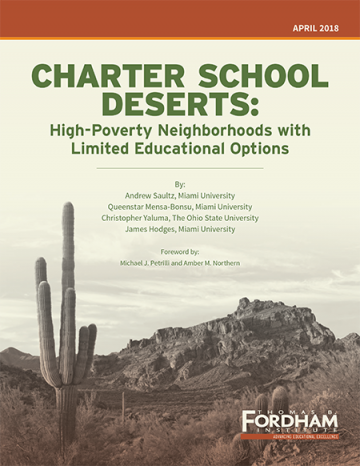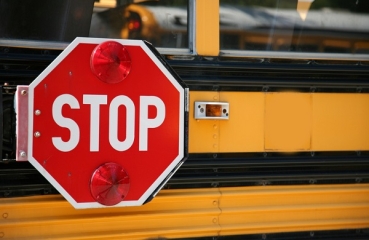Ohio to Florida: Better schools for thee but not for me?
Chad L. AldisIf you were on vacation earlier this month—lucky you—you may have missed the release of the 2017 NAEP results. On the whole, you didn’t miss much.
We should irrigate charter school deserts. Here's how.
Michael J. Petrilli, Amber M. Northern, Ph.D.By Michael J. Petrilli and Amber M. Northern, Ph.D.
No, NAEP scores in California don't evince a lost decade of educational progress
By Michael W. Kirst
NEW REPORT: Charter School Deserts: High-Poverty Neighborhoods with Limited Educational Options
The Education Gadfly2016–17 was one of the slowest-growth years for charter schools in recent memory. Nobody knows exactly why, but one hypothesis is saturation: With charters having achieved market share of over 20 percent in more than three dozen cities, perhaps school supply is starting to meet parental demand, making new charters less necessary and harder to launch.
Charter School Deserts: High-Poverty Neighborhoods with Limited Educational Options
Andrew Saultz, Queenstar Mensa-Bonsu, Christopher Yaluma, James Hodges2016–17 was one of the slowest-growth years for charter schools in recent memory. Nobody knows exactly why, but one hypothesis is saturation: With charters having achieved market share of over 20 percent in more than three dozen cities, perhaps school supply is starting to meet parental demand, making new charters less necessary and harder to launch.
Some racial and ethnic groups do much better on NAEP than others. Here are some factors that might explain why.
Brandon L. WrightBy Brandon L. Wright
How accountability metrics related to student subgroups affect teacher turnover and attrition
Amber M. Northern, Ph.D.By Amber M. Northern, Ph.D.
Differences between classroom assignments in low- and high-poverty schools
Emily HowellBy Emily Howell
O-H-I-No?
On this week's podcast, Paolo DeMaria, Ohio's State Superintendent of Public Instruction, joins Mike Petrilli and Brandon Wright to discuss the state’s new strategic plan for education, which Fordham’s gadflies find disappointing. On the Research Minute, Amber Northern examines the access, perseverance, and outcomes of first-generation college students.
The tragic lack of progress for Ohio’s low-income and black students
Aaron ChurchillAchievement gaps between poor and minority students and their peers are well documented and persistent. For years, data indicate that these students have generally been making slow but steady progress.
Findings about school choice programs shouldn't be applied to individual schools
Michael J. PetrilliBy Michael J. Petrilli
Keep what's valuable in the discipline guidance—but drop the racial quotas
Michael J. PetrilliBy Michael J. Petrilli
A better curriculum in the Bayou State
On this week’s podcast, Rebecca Kockler, Louisiana’s assistant superintendent of academic content, joins Mike Petrilli and Robert Pondiscio to discuss her state’s curriculum initiative. On the Research Minute, Amber Northern examines how career and technical education affects students’ noncognitive skills.
No, the new GAO report on discipline doesn't prove racial disparities are caused predominantly by racial bias
David GriffithBy David Griffith
For the vast majority of school choice studies, short- and long-term impacts point in the same direction
Michael J. PetrilliBy Michael J. Petrilli
When looking only at school choice programs, both short-term test scores and long-term outcomes are overwhelmingly positive
Michael J. PetrilliBy Michael J. Petrilli
When it comes to graduation requirements, mastery matters
Jessica PoinerA recent paper from the left-leaning Center for American Progress (CAP) examined high school graduation requirements across the nation to determine whether they were aligned with requirements for each state’s public university system.
How to think about short-term test score changes and long-term student outcomes
Michael J. PetrilliBy Michael J. Petrilli





















